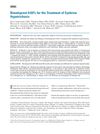 14 citations,
April 2019 in “PLOS ONE”
14 citations,
April 2019 in “PLOS ONE” Skin cancer is common in elderly nursing home residents, with risk factors including being male, having light skin, outdoor work history, and smoking. Regular skin checks are recommended.

research Acne
4 citations,
January 2019 Acne is a common skin condition that can be influenced by diet, lifestyle, and hormones, and requires a treatment approach that includes psychological considerations.
 11 citations,
June 2020 in “Dermatologic Therapy”
11 citations,
June 2020 in “Dermatologic Therapy” Combination therapies work better than single treatments for hair loss.
 27 citations,
September 2017 in “Journal of Medicinal Food”
27 citations,
September 2017 in “Journal of Medicinal Food” Annurca apple supplement safely increases hair growth and keratin in humans.
January 2009 in “Journal of Pakistan Association of Dermatology” Systemic cyproterone acetate and 5% topical minoxidil are effective and safe for treating female pattern hair loss.
 January 2021 in “The Ochsner journal”
January 2021 in “The Ochsner journal” ADHD stimulant medications might be linked to a specific type of hair loss called Alopecia Universalis.
 4 citations,
September 2014 in “Elsevier eBooks”
4 citations,
September 2014 in “Elsevier eBooks” Use some skin medications with caution during pregnancy; avoid strong steroids, certain eczema treatments, and systemic retinoids, but many topical treatments and nasal sprays are safe.
 3 citations,
November 2022 in “Advances in Clinical and Experimental Medicine”
3 citations,
November 2022 in “Advances in Clinical and Experimental Medicine” Electric pulse treatments for breast cancer show promise in being safer and more effective, with fewer side effects.
1 citations,
October 2022 in “Evidence-based Complementary and Alternative Medicine” Traditional Chinese Medicine may help treat hair loss but needs more research.
 13 citations,
February 2022 in “JAMA Dermatology”
13 citations,
February 2022 in “JAMA Dermatology” Spironolactone does not increase cancer risk and may lower prostate cancer risk, but more research is needed.
 January 2008 in “Springer eBooks”
January 2008 in “Springer eBooks” Thyroid disease can cause hair loss and treating thyroid problems might help with hair disorders.
 44 citations,
November 2010 in “Current Opinion in Supportive and Palliative Care”
44 citations,
November 2010 in “Current Opinion in Supportive and Palliative Care” Many patients find hair loss from chemotherapy very distressing, and while treatments like minoxidil and scalp cooling may help, there is no sure way to prevent it.
 15 citations,
December 2019 in “Aesthetic Surgery Journal”
15 citations,
December 2019 in “Aesthetic Surgery Journal” Most insurance companies do not cover extra gender-affirming surgeries, with coverage being low and inconsistent.
 6 citations,
October 2017
6 citations,
October 2017 Indian Gooseberry has potential for cancer prevention and treatment and promotes hair growth.
 August 1986 in “Journal of The American Academy of Dermatology”
August 1986 in “Journal of The American Academy of Dermatology” Minoxidil showed a 30% success rate for hair growth in a study, and various skin treatments were effective, but some had limitations or side effects.
34 citations,
January 2022 in “Molecules/Molecules online/Molecules annual” Natural ingredients in cosmeceuticals are beneficial for skin and hair health with few side effects.
 April 2016 in “Plastic and reconstructive surgery. Global open”
April 2016 in “Plastic and reconstructive surgery. Global open” The supplement highlighted advancements and challenges in plastic and reconstructive surgery, including the impact of smoking, chemotherapy, and new treatments like Tafluprost for hair loss.
 275 citations,
March 1999 in “Journal of The American Academy of Dermatology”
275 citations,
March 1999 in “Journal of The American Academy of Dermatology” Chemotherapy can cause various skin reactions, with hair loss being the most common, and proper diagnosis and treatment of these reactions are important.
 20 citations,
January 2000 in “Dermatologic Clinics”
20 citations,
January 2000 in “Dermatologic Clinics” New psoriasis treatments are effective but come with side effects and risks.
 2 citations,
July 1998 in “Dermatologic Clinics”
2 citations,
July 1998 in “Dermatologic Clinics” European dermatologic treatments focus on lifestyle and psychosocial factors, use diverse methods like baths and climate therapy, and emphasize the importance of diet and supplements for skin health.
 12 citations,
June 2019 in “Actas dermo-sifiliográficas/Actas dermo-sifiliográficas”
12 citations,
June 2019 in “Actas dermo-sifiliográficas/Actas dermo-sifiliográficas” Proper skin toxicity management in chemotherapy is key to continuing treatment and keeping patient quality of life high.
5 citations,
May 2018 in “Therapeutic advances in drug safety” Androgen use may increase the risk of stroke, but more research is needed.
 124 citations,
July 2012 in “Archives of Dermatological Research”
124 citations,
July 2012 in “Archives of Dermatological Research” Targeting androgen receptors could be a promising way to treat skin disorders with fewer side effects.
 21 citations,
June 1990 in “British Journal of Dermatology”
21 citations,
June 1990 in “British Journal of Dermatology” Systemic retinoids are effective for psoriasis but have side effects; benefits may outweigh risks, especially when reducing cancer risks from other treatments.
 January 1989 in “Side effects of drugs annual”
January 1989 in “Side effects of drugs annual” Some cancer and immune system drugs can cause serious side effects, including heart, lung, nerve, and organ damage, which need careful monitoring and management.
 45 citations,
January 2020 in “International Journal of Molecular Sciences”
45 citations,
January 2020 in “International Journal of Molecular Sciences” Some natural compounds may help overcome drug resistance in certain cancers, but more research is needed.
 10 citations,
January 1994 in “Advances in pharmacology”
10 citations,
January 1994 in “Advances in pharmacology” New drugs targeting DNA enzymes show promise for cancer treatment but have side effects like immune system suppression and hair loss.
276 citations,
April 2003 in “Molecular endocrinology” Vitamin D is important for bones, hair, blood pressure, and breast development.
 7 citations,
April 2017 in “Dermatologic surgery”
7 citations,
April 2017 in “Dermatologic surgery” Hyaluronic acid fillers and combination treatments significantly improve facial defects from autoimmune diseases and are well-tolerated.
 3 citations,
December 2016 in “Journal of epidemiological research”
3 citations,
December 2016 in “Journal of epidemiological research” Estrogen and androgenic hair increase melanoma risk, especially in European-ancestry individuals.
























